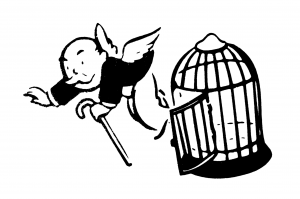Greta has a post from last week on social media and the risks of reading-in — how it’s possible to conclude too much from who someone else adds or blocks, or what they like or share; why guessing their motives is a bad idea.
I mostly agree with the thrust of it. On being unfriended, I’ve learnt not to assume the worst — I also have closeted friends whose parents monitor their feeds, and I’ve had my online presence dissected creepily. I doubt I’d go as far as Greta does — I check my mutual friends with strangers who add me, gauge who people on Twitter are by who else they follow, delete contacts who share posts from Breitbart uncritically. (There are things there’s no good reason to Like.) Reading the Facebook leaves is like reading body language — not bunk, but only reliable if you know someone, or when there isn’t room for doubt.
At Butterflies and Wheels, Ophelia Benson complains people made assumptions about her motives on Facebook before she left this site. (‘Greta herself blocked me’, she writes, followed by the words ‘presumably’ and ‘because’.) To quote one preoccupied-sounding commenter,
Alex Gabriel spent an entire blog post of several hundred words to say, basically, ‘I can’t point to anything wrong that Ophelia has said or done, but I really think she’s up to something . . . the entire thing was composed of exactly what [Greta] is now lamenting.
That post — the one post, hitherto, in which I ever criticised Ophelia — seems to provoke similar thoughts in her. It was, she wrote in late August, ‘not a matter of disagreeing with me, [but] of sniffing out my heresy and denouncing it.’
I pointed, it turns out, to a long list of things she did that readers were interpreting — not, I thought, irrationally — as trans-antagonistic. Namely:
- Treating requests she acknowledge Julie Bindel’s public, well documented, continuing anti-trans history as demands for cultish, unquestioning belief.
- Writing ‘I’m not all that interested in the exact quantity of transphobia contained in Julie Bindel’ when commenters brought it up.
- Uncritically citing anti-trans activists ‘quite a lot’.
- Uncritically sharing an anti-trans author’s attack on the word ‘TERF’.
- Displaying more hostility to trans commenters than transphobic ones.
- Displaying no regret on misgendering a trans commenter.
- Responding to Vanity Fair’s ‘Call me Cait’ story solely by objecting to Caitlyn Jenner being told ‘You look great’ by staff at Jezebel.
Anyway.
Between the post and her comment section Ophelia says this (dashes added for readability):
Greta was vocally and explicitly happy to see the way our colleagues were trashing me on their blogs, partly on the basis of that creepy intrusive secret-police-like trawling through my Facebook. On the back channel — I think I blogged about it shortly before I left the network — Lilandra had the bright idea of starting a thread with my name in the subject line suggesting we all discuss me, so several people jumped at the opportunity to rip me to shreds. Ed said let’s not do this this is a really bad idea, but they ignored him. I said using our blogs to shred each other wasn’t a fabulous idea and I’d assumed we all knew not to do that. That’s when Greta made her brave stand for the importance of using our blogs to shred each other.
I have a few things to say about this. Continue reading “What Happened On The Back Channel When Ophelia Benson Left Freethought Blogs”



